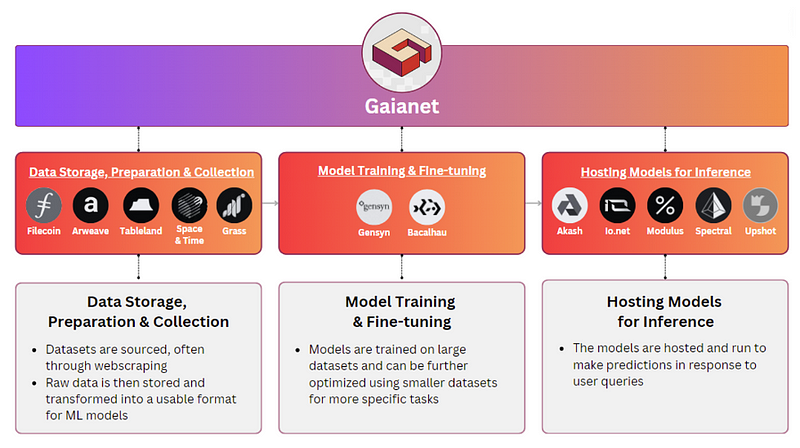From Centralization to Collaboration: The Case for Decentralized AI
Decentralized AI not only offers technical advantages but also empowers individuals from around the globe to contribute their expertise, assets, and intellectual property.

Artificial Intelligence (AI) has undeniably transformed numerous aspects of our lives, from powering virtual assistants to enhancing medical diagnostics. Yet, behind the scenes, the control over AI models has largely been consolidated within the realms of major centralized enterprises like OpenAI, Google, and Anthropic. This centralized control has raised concerns and skepticism among many, prompting a growing interest in decentralized AI.
In the current landscape, major centralized enterprises wield authoritative control over AI models, dictating the dissemination of results and influencing decision-making processes. Recent events, such as the leadership turmoil at OpenAI, have highlighted the internal conflicts and content suppression that can arise from centralized management. While centralized control may have its merits, there are compelling reasons to explore the decentralization of AI. Decentralized AI offers a more future-proof path forward, leveraging crypto coordination and incentivization mechanisms to enable ongoing model discovery and operationalization. This approach allows for tailored applications that may not be adequately addressed by centralized model corporations.
In the current era of centralized AI, users often find themselves at the receiving end of information and insights generated by AI models without fully understanding the sources behind them. This lack of transparency not only obscures the origins of AI-generated content but also raises questions about its reliability and bias. With centralized entities controlling the flow of information, users are left in the dark about the datasets and algorithms shaping their AI-driven experiences.
Decentralized AI offers a remedy to this opacity by prioritizing transparency and accountability in the data sourcing process. By leveraging decentralized networks, users gain visibility into the origins of the data used to train AI models, enabling them to assess its quality and relevance. This newfound transparency empowers users to make informed decisions about the information they consume and the AI technologies they interact with.
Moreover, decentralization encourages a diverse array of data sources, mitigating the risk of bias and promoting inclusivity in AI-driven content. Instead of relying on a single centralized entity for data, decentralized AI platforms tap into a global network of contributors, each bringing their unique perspectives and expertise to the table. This collaborative approach not only enriches the quality of AI-generated content but also ensures a more balanced and representative portrayal of information.
In essence, decentralization prompts a paradigm shift in how we perceive and interact with AI-driven content. It compels us to question the origins of the information presented to us and encourages a more critical and discerning approach to AI technologies. By paying attention to where AI gets its information from, users can safeguard against bias, misinformation, and manipulation, ultimately fostering a more informed and empowered society.
Decentralized AI not only offers technical advantages but also empowers individuals from around the globe to contribute their expertise, assets, and intellectual property. By fostering a collaborative environment, decentralized AI accelerates the advancement of AI technology, driving innovation and progress in ways previously unimaginable. In essence, decentralizing AI holds the promise of democratizing access to AI technologies, fostering transparency, and promoting innovation. By decentralizing control and empowering individuals, we can unlock the full potential of AI and create a more inclusive and equitable AI ecosystem for all. Decentralized AIs like Gaianet have been constructed to fill these gaps in the current AI industry:
- Censorship and Bias in AI Outputs to Users: The current AI industry grapples with the issue of censorship and bias in the outputs delivered to users. Centralized entities implementing AI often wield significant control over the information and responses generated by AI models, leading to the propagation of biased or censored content. This phenomenon not only hinders the dissemination of unbiased and diverse perspectives but also raises concerns about the authenticity and inclusivity of AI-driven outputs.
- Lack of Privacy for User Data: Another prevalent pain point in the AI industry pertains to the lack of privacy for user data. Centralized AI systems typically accumulate massive volumes of user data, raising apprehensions regarding data security and privacy breaches. Users often find themselves at the mercy of opaque data handling practices, with limited control over how their personal information is utilized and safeguarded. This situation engenders a pervasive sense of vulnerability and distrust, posing a substantial challenge to the widespread adoption of AI technologies
- High Costs of Utilizing and Building on Centralized AI Models: The exorbitant costs associated with utilizing and developing upon existing AI models by centralized enterprises present a significant impediment within the AI industry. Access to advanced AI capabilities often comes with hefty financial demands, placing a formidable barrier to entry for smaller organizations and independent developers. The centralized control over AI models not only restricts innovation but also engenders a sense of exclusivity, limiting the democratization and widespread application of AI technologies.
While the transition to decentralized AI may present challenges, its potential to democratize access, foster innovation, and empower individuals cannot be ignored. As we navigate the complexities of the AI landscape, embracing decentralization offers a path forward that prioritizes transparency, collaboration, and progress. It’s time to rethink the way we approach AI and embrace the transformative power of decentralization.
Contact Info:
GaiaNet@wachsman.com
About GaiaNet.AI
GaiaNet is a decentralized network that provides secure, censorship-resistant, and monetizable AI agents that incorporate each individual’s proprietary knowledge and skills while preserving privacy.
Instead of setting up centralized servers, GaiaNet is building a distributed network of edge-computing nodes controlled by individuals and businesses, to host fine-tuned AI models, based on the node operator’s proprietary domain knowledge and expertise.


